Interview: Limitless' Bradley Cooper
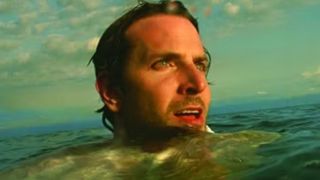
While promoting the film Limitless, Bradley Cooper brought up an interesting topic: the character an actor plays winds up reflecting upon that actor. Basically at one time Cooper was seen as the nice guy from Alias then the jerk from Wedding Crashers and then the good looking smart aleck from The Hangover. Nowadays Cooper is most directly associated with Phil thanks to The Hangover’s continued success, but he’s gearing up to turn that image upside down yet again with his latest film, Limitless.
Cooper plays a guy named Eddie Morra, a writer who was once on top of the world with a book deal, but now sees that deal winding down with no book to show for it. Everything changes when Eddie comes across a new illegal drug called NZT. He pops one pill and is granted access to his entire brain, allowing him to recall every touch, taste or smell he ever encountered, digest information at an incredibly accelerated rate and ultimately always be steps ahead of the competition. Sounds too good to be true, right? Of course. Like most drugs, NZT has its downsides and they’re deadly. If Eddie is going to stay alive and continue to build upon his newfound success, he’s going to have to keep the NZT flowing.
During a recent press conference Cooper went into depth about his character and NZT in addition to the actual filmmaking process and how he shot one of director Neil Burger’s many visual tricks. Cooper also recalled his very first encounter with his co-star, Robert De Niro, and touched upon The Hangover and how that film’s success changed his life and enabled him to take on projects that he’s passionate about, like Limitless. Read about all that and more in the interview below.

Can you tell us a little about Eddie Morra? How’d you see him as a character and come to choose this role?
Bradley Cooper: I read the script maybe eight months ago that Leslie Dixon wrote based on this novel by Alan Glynn, an Irishman who wrote I think in 2001 or ‘04 called The Dark Fields. I didn’t read the novel until after I got the role. I didn’t even know it was a novel, but she wrote this incredible script with a phenomenal character. And I met with Neil Burger because I just thought, ‘Oh, wow, to play a guy that goes from A to Z like that would just be incredible,’ and so I met with him and just tried to basically pitch him why I had to play it and I think about six months later, we got the offer to do it and then it was about just hopefully getting it made.
I liked the idea that when we meet [Eddie], it’s not that he feels sorry for himself at all, he’s just actually resigned to the fact that his life is such that his potential wasn’t fulfilled and that’s where we meet him that day. It was cool when he had a book contract when he was 25 and he talks about how great it’s going to be, but when he’s 35 and it still hasn’t been written, it’s just not cool anymore. To then see a guy who goes from this sort of complacency to then having power and what he does with that power and what his plan is, which I still don’t know. His plan was not to make money at all. He says when he comes out of the water, ‘I had a plan, money was going to allow me to get there.’
Once Eddie takes the drug, he finishes his book, but goes through a career change. If you had access to this drug that made you potentially limitless, do you think you’d still be an actor?
CINEMABLEND NEWSLETTER
Your Daily Blend of Entertainment News
I think for sure I’d definitely try to learn as many languages as I could right away and then I would probably, after that, much like he did, learn as many instruments as I could. After that I don’t know, but I’d probably try to get money so I could go around and utilize that. But it would be incredible to just like start jamming with all these great musicians and communicating with people wherever you are in all the different dialects. I don’t know what I’d do after that, but I would still be an actor. Even director. I’d probably start finally getting off my ass and facing the fear because all I really want to do is direct movies anyway; I just haven’t done it.
Like what?
There’s this one story that I absolutely love, but yeah, just to do stories that I love. You have to as a director. There’s got to be something you want to tell and that’s the engine which spurs all of the work you have to do in order to create the story, but you have to love some sort of nugget of what you’re telling to be a filmmaker.
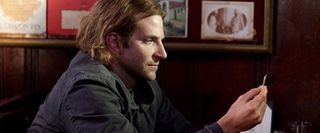
This is very much your thing; most of the film rests on your shoulders. What challenges does that create for you personally? What do you expect from yourself?
I want to answer that in two ways. One, I didn’t feel like it rested on my shoulders because I didn’t direct the movie. It’s Neil Burger’s film. I was allowed the opportunity to help be the guy on the field to play this character who the story revolves around and I loved it, which might end up being my downfall. I made myself a very small window of what I enjoy in this business, which is I love being a big part of the storytelling process. It really fulfills me. Whether or not I’ll get that opportunity again, I don’t know. I hope to, but, you know, if this movie’s successful then I probably will. If it’s not, it’ll be harder to, but I absolutely loved it. I found a hook with Eddie early on, reading the script so I never felt the pressure of, ‘Oh my god. How am I’ – I just couldn’t wait to get out and play him each day. I tend to speak very fast and so I liked these paragraphs I had to memorize and speak because when he’s on the drugs, there’s no “you know” or stutter, anything. He thinks in these succinct paragraphs that just come out. Neil shot a lot of those in one so there was no cut. It was almost like doing a play. I loved that experience.
Regarding roles, when it comes to dramas like Limitless versus something like The Hangover, which is comedic, what mindset do you use to prepare for either role?
Same mindset. It’s playing a role and whatever that happens to be, it may demand different ways in, but the structure’s the same in terms of you have to prepare. Acting’s acting whether it’s comedy or drama; there’s a music to it and the music changes with comedy.
What’s the difference between a kind of adrenaline rush that focuses you when you’re acting and the experience of the drug that gives you access to all of this extra information and knowledge?
I made things specific for me because the idea of reading up on the way neuropathways operate in one’s brain and how synapses functions wouldn’t serve me in terms of organically inhabiting that idea. I had to find something specific for me, which had nothing to do with anything like that in order to play whatever that expansiveness is in my mind. I didn’t choose the feeling of adrenaline from doing something whether it’s playing a sport or getting into a fight or acting on stage just because, to me, my experience sensory-wise with that is – maybe I should have. I probably should have. It would have been better. [Laughs] But it feels like I’m on a drug when those endorphins are released and for me. NZT, it wasn’t a drug. It didn’t feel like it was on a drug; it was just clear and focused. There was a calm to him, to me, when I was doing that that I worked on. And he actually says that when he says, ‘I wasn’t high, I wasn’t wired, I just knew what I wanted to do and how to do it,’ and that was it right there, focused.
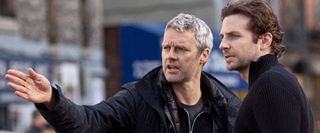
You spoke earlier about your choice of storytelling and how you feel the necessity to have a kernel that you love. If you could term that kernel an essential truth, what would it be?
The nugget, well, if it’s a truth, it’s love because I have to love something in order to have it mean something to me, but it changes for everything. There was a moment in the script that I read where I though, ‘Oh yeah, I have to do everything I can to try to play that role.’ It was one moment.
SPOILER ALERT
What was it?
It was when he drinks the blood. I thought I’d never seen that before and if it’s pulled off, the movie works. If it doesn’t, it fails. And in that moment, if the audience is laughing at the movie, the movie doesn’t work, but if they’re laughing because, ‘Oh my – what the hell’s going on, I feel weird,’ and, ‘this is crazy,’ that’s a good thing. But for Eddie, it’s an example of how low or where he’s willing to go to survive and to maintain whatever it is that power that he has and I just sort of loved that, ‘Wow, how do we get from this guy in the beginning of the movie to that moment?’ For every movie it’s been a moment. For Hangover it was the phone call, when I called Tracy.
Did the finished product coincide with your vision of it?
Yes! The blood drinking? Yeah, I mean, we had to adhere to ratings and stuff like that, so it wouldn’t be exactly, but yeah, I’d say so.
END SPOILER ALERT
Can you tell us about Eddie’s enhanced abilities?
Anything he’s ever seen or tasted or smelled since basically in the womb he can recall in an instant and utilize for whatever way he wants and then by the end, this idea that the drug has evolved in such that he’s able to utilize physics in every possible way so that he’s able to read the temperature of where he is when putting his hand on his skin. Somehow he’s able to have a connection with the blood and the flow and whether there’s a blockage and stuff like that. You know, normal shit. [Laughs] And looking at behavior. He could tell that that guy was texting and then he was able to figure out there’s sixty feet and in order to stop the truck and the way the breaks worked that 30 feet wouldn’t be enough, that he’s going to rear end that taxi. So it’s not like he’s omniscient at all. It’s just all logic, but he could do it like that. [Snaps]
And he can see really far.
Well, I mean, not like Superman. But if you saw someone texting, you could probably see their head’s down, but they’re driving. It’s as if you weren’t looking at Carl Van Loon, you were literally watching that van, you could probably tell 60 feet out, 30 feet out that he’s texting. It’s not like his vision all of a sudden has improved because of the drug at all, it’s just how he’s able to utilize his brain.
You’ve always been a successful working actor, but with The Hangover your career really took off. How’d you experience this? Did you ask yourself, ‘Why now?’ And I read somewhere you wanted to become a chef when you were young.
Why am I not a chef? [Laughs] Clearly being a part of a movie that’s so financially lucrative provides opportunities and that’s what that movie did for everybody. And with that comes a higher profile, so you have paparazzi; that was a new thing. You just have to learn to navigate. The great part is that I was able to do a movie like Limitless. Maybe Relativity wouldn’t have hired me to do it if I hadn’t been part of The Hangover, which was so successful. I love cooking. [Laughs] I was more interested to play a chef than to be a chef, so I think that told me early on that acting was where I wanted to go.
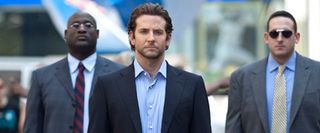
There are a lot of rumors that Charlie Sheen is going to be your co-star in Hangover 2. Confirm, deny and also, what are your thoughts about working with him?
Well, unless they have a time machine and we can go back to Bangkok, my understanding is that we already filmed that movie, so I’m not quite sure. It’s an interesting thing to start spreading, but you’d have to be a part of the Starship Enterprise I think in order to make that happen.
Would you want to work with him possibly in the future?
Yeah, I mean, you know, sure.
The Hangover franchise has a major effect on your on screen image. Has that caused you any concern about being locked into a genre?
It doesn’t scare me only because I operate pretty simply; I want to work with great filmmakers and great actors and get better as an actor.
Doing a TV show like Alias, for example, I played probably the nicest guy in the world, this guy Will Tippin who’s a journalist, and I would audition for movies during that time and afterwards and normally the feedback would be, ‘He’s such a nice guy, Bradley. I don’t really see an edge, but such a sweet guy. Please tell him we loved meeting him.’ And then David Dobkin took a real chance and hired me as the heavy in Wedding Crashers to play a sociopathic bad guy and then it became, ‘Bradley, he’s an asshole, right?’ I mean, really! ‘Because it seemed like he’s really an asshole.’ [Laughs] ‘Ah, he wasn’t acting. I could tell there was something really deep going on.’ [Laughs] It’s beyond my control who’s going to cast me or how you’re going to pigeonholed, so for me, it’s just I want to keep doing different things because I want to get better, so hopefully I’ll be hired to do them. So Hangover was a huge success; will it mean that I’ll be cast in movies like that? No, because I won’t do movies like that. But then it also might mean I’ll never work, so we’ll see.
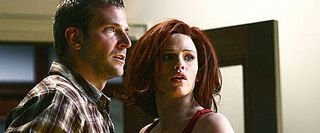
How was it getting to work with Robert De Niro?
Talk about icing on the cake. Never when I first got the movie did I think that Carl Van Loon would be played by Robert De Niro. And my past with him, without him knowing it, goes back a long way, [laughs] just because he’s the reason I became an actor, pretty much. I went to school at the Actor’s Studio MFA program here in New York and he came to our school and I asked him a question and that meant like the world to me because –
Do you remember the question?
I wanted to ask him the question I asked, but I was so scared that it was such a stupid question that I was going to ask some bullshit question about The Mission. There’s a scene in The Mission, this profile shot when he’s with the epee and I was going to say like, ‘Hey, did you train with swords’ and some stupid thing and right before, because we had the microphone thing like this, someone stood up and asked him about The Mission and I thought, ‘Well, I can’t ask him about The Mission.’ So then they came to me and I was sort of standing there and all of a sudden the real question I wanted to ask him came out which was, ‘When you were doing Awakenings,’ there’s a scene where he wants to go for a walk and he has to be interviewed by the medical panel and he’s trying so hard to be normal but whatever he was taking, it started to not work anymore and so he started to get the ticks and one tick was his right hand and he would make up for it by pretending to brush his eyebrow and he was like this when he was talking and I thought, god, it was so genius and I asked him, ‘Is that something you saw people do because they were embarrassed by their ticks, make up for it some way or is that something that just happened?’ And then he literally went like this, he went, [imitating De Niro] ‘Yeah, I didn’t, uh, no I didn’t see anybody do that, but, uh, that’s a good question.’ [Laughs] It was like a beam of light shot into my chest! I was so excited! I never sat down, too and I looked around like, ‘Did everybody hear that? He said that, right?’ Yeah, so that was the first experience with Robert De Niro.
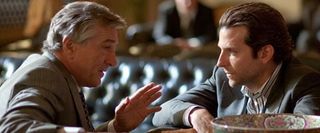
At the beginning of the film, did you ever feel like Eddie, like you were down and out?
Sure. Absolutely. Oh god, yeah. As a human being, yeah. If anybody’s in touch with themselves, do you feel worthless at points in your life and things aren’t going to happen the way you wanted them to? Yeah.
When was that for you?
Today. [Laughs] Just now. Just when I was speaking to that lady.
So, you doubted your career?
Oh, of course!
What was it like doing the scenes where you’re shooting yourself multiple times? How much time did you spend doing those?
That was all Neil Burger who directed the movie who came up with all that. I had only seen in Being John Malkovich. It was very time consuming and it was a movie that we were slammed for time. It was a very get-up-and-go and so it was very sort of mathematical, but I really enjoyed that. I like having to act within the structural confines. There’s something interesting about that because you have to go here and here and you have to be able to be organic in that little space. Not necessarily that stuff because I was just cleaning the apartment.
Staff Writer for CinemaBlend.
Most Popular






